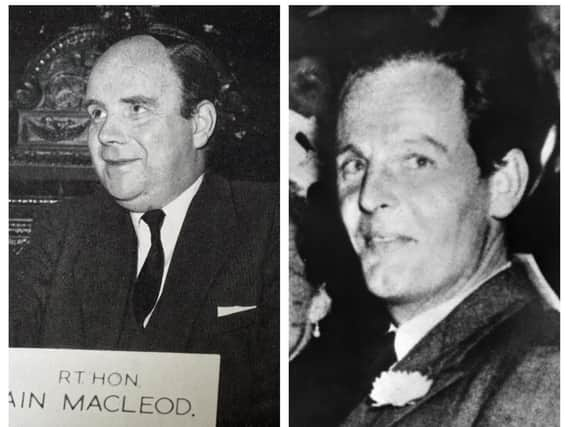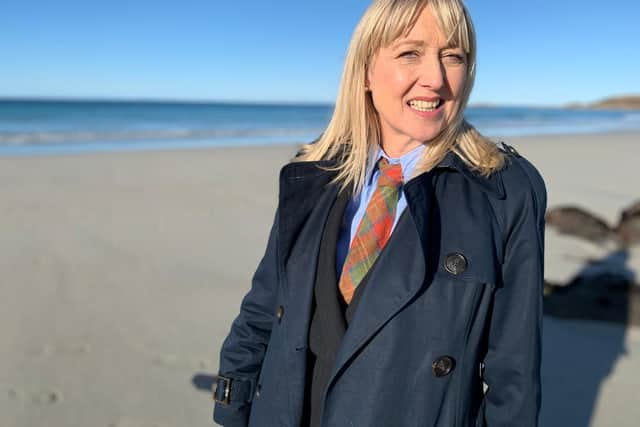Meet two 'sons of the Hebrides ' - A KGB spy and a professional gambler turned Tory MP


Macleod MP/MacLean KGB looks at the lives of Ian Macleod MP, a former professional gambler from Lewis who rose to become Chancellor of the Exchequer in the 1970 Conservative government, and Donald MacLean, a diplomat from Tiree who became Stalin's favourite spy.
Here, Ms MacDonald looks at both men whose common roots led them on very different paths through a world tangled with intrigue, power, recklessness and betrayal.
Advertisement
Hide AdAdvertisement
Hide AdIain Macleod and Donald MacLean were the ‘ying’ and ‘yang’ of Cold War politics. Both were of Hebridean stock and born in 19013, both went to Cambridge University and both had uncompromising political visions about how the world should be. That’s where the similarities end.


Donald MacLean, the product of strict Tiree Presbyterianism, ditched Calvinism for Communism. Part of the Philby, Burgess and MacLean spy ring he became Soviet Russia’s most effective agent and Stalin’s star spy.
Iain Macleod took another path – rising to the heart of the British establishment, becoming an MP, a mould-breaking Colonial Secretary and Chancellor of the Exchequer. He may be Britain’s ‘lost’ Prime Minister.
As someone who shares the Hebridean crofting and Presbyterian background in which these men were rooted, I became intrigued by the different paths they took. As we shot the programme it quickly became clear that both paid a price for trying to reshape the work according to their beliefs. Roland Philipps, MacLean’s biographer, told me that MacLean hated being a spy and compared it to being a lavatory attendant, saying, ‘It's a terrible job but someone has to do it.’
That terrible job – betraying his country’s secrets – led MacLean to heavy drinking, a breakdown, flight and exile. But he was an effective spy, and leaked Churchill and President Roosevelt’s ‘bottom line’ position for the Yalta conference in 1945 which carved up Europe between Russian and the west. MacLean’s information allowed Stalin to extend Soviet control for a further 200 miles into Western Europe. He also supplied Russia with top secret information about America’s Cold War atomic bomb building capability.
While filming in Cambridge, I walked the few hundred yards between the colleges which MacLean and Macleod attended. Two Anglo-Scots of Hebridean backgrounds, living a few hundred yards apart and close to the same student pubs and sports fields. There is no written evidence that they ever met. But who knows?
Although Iain Macleod left Cambridge to become a playboy and professional gambler, wartime service as an infantry officer made him take life seriously. He embraced ‘One Nation’ Toryism even before he was demobbed and in 1945 stood as Conservative candidate in the Western Isles, coming bottom of the poll. Eventually elected as an MP for a London seat in 1950 he rose quickly, and Harold MacMillan – himself the great-grandson of an Arran crofter – gave him the job of negotiating the independence of Britain’s African colonies. The radical young Colonial Secretary was detested by the empire-loving hard-right of his party.
Ken Clarke, the recently retired Tory MP and Father of the House, told me: ‘They hated him. He was giving away the empire. Ian went through all this process of these great constitutional conferences giving independence to Ghana, Nigeria and Kenya and ‘letting down our kith and kin in Southern Rhodesia’ and not letting the white farmers keep rural their minority rule indefinitely. I wasn't in Parliament then, but I’m told that some of the MPs so hated him that they sent him to Coventry and wouldn't even speak to him in the House of Commons.’
Advertisement
Hide AdAdvertisement
Hide AdClarke, a ‘big beast’ of the Tory party, cites Iain Macleod is his ‘political idol.’ Clarke attended the same Cambridge college as Macleod and the politician often returned to speak there. The undergraduate Clarke’s meeting with his hero had a profound influence on him. ‘Made me the one nation Conservative that I am today,’ Clarke told me.
In his final speech as Colonial Secretary Macleod was unrepentant, quoting Robert Burns’s A Man's a Man for A' That and declaring ‘I believe quite simply in the brotherhood of man – men of all races, of all colours, of all creeds.’
Macleod was appalled by the ‘magic circle’ of toffs and landowners that went to the House of Lords to find a new Conservative leader, and he refused to serve under Sir Alex Douglas Hume. We searched out the clip from the satirical show Not So Much A Programme More A Way Of Life in which Bernard Levin called Sir Alex ‘a cretin.’ Macleod, a guest on the show, looked uncomfortable, but didn’t walk off. The Tory right was furious.
Macleod made it back into the front-line of politics when Edward Heath made him Chancellor in 1970. A month later, he had a heart attack in 11 Downing Street and died shortly after. He was only 56. Overwork, heavy smoking and a WW2 injury may all have contributed to his death. Some of the people we interviewed for the programme believe that he might have succeeded Heath as Prime Minister. In this alternative universe the Thatcher years may never have happened. It’s an intriguing thought.
Macleod once said that if ever ennobled he’d choose the title ‘Lord Macleod of Borve’, in honour of the family connection with that district in Lewis. And MacLean? Roland Philipps believes that had he not been unmasked he might have risen to become head of the Foreign Office, and become Sir Donald MacLean. A Soviet agent at the head of the Foreign Office? It seems extraordinary, but the brilliant young diplomat with Marxist beliefs almost pulled it off.
Macleod MP / MacLean KGB screens on BBC ALBA at 9pm-10pm on Monday 23rd December and it will be repeated on Sunday 29th December at 9pm-10pm.
